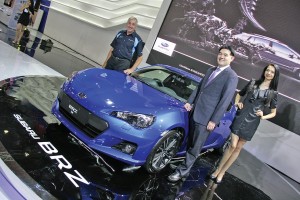
GLENN Tan (center), chief executive of Motor Image Group, is joined by stunt driver Russ Swift and a model in presenting the BRZ.
It’s no secret to the local motoring media that the Philippine market, despite its modest size, is Motor Image’s favorite market. It’s one dear to Glenn Tan, chief executive of Motor Image Group, the exclusive distributor of Fuji Heavy Industries/Subaru vehicles in Asean (excluding parts of China). That’s because the Philippines is the only market that Motor Image/Subaru has been able to properly position itself as a premium Japanese brand with a very strong brand equity, brand image, brand following and loyalty. Subarus are genuinely considered aspirational vehicles in the Philippines.
Hence, a group of journalists, myself included, was invited to visit Jakarta, Indonesia, for the regional launch of the Subaru BRZ sports car, and the Malaysian-built RHD XV cross-over utility vehicle. While the Malaysian-built XV will never reach our shores, it was important to witness the unveiling and the test drive of the XV as many critics will argue that a vehicle made in Japan will always be superior to its brethren made elsewhere. More on that later.
Jakarta is a huge country, predominantly Muslim, with a total vehicle market pushing 800,000 cars, four times bigger than our market. Their automobile industry seems very well supportive of one another, and during the Indonesian International Motorshow, practically all brands were present. They even welcomed grey-market importers to participate in the show. I just wish our own industry could stop politicking, stop picking sides and just be content to work and support each other. After the Chamber of Automotive Manufacturers of the Philippines (Campi) and Association of Vehicle Importers and Distributors (Avid), another group might be formed sooner or later.
What’s interesting is that, according to Mike Luyun, the new general manager of Motor Image Pilipinas, Subaru’s authorized local distributor in the country, the vast majority of cars sold in Indonesia are bargain-base model cars, with the average Indonesian seemingly contented and will drive it until the wheels fall off. Here in the Philippines, it is very different because everyone strives to maximize their car purchase given the budget they have. I guess we truly see cars as a necessity instead of investment as we spend a whole lot of time inside it and we want to be happy with what we paid for.
Back to the Subaru trip, Glenn wanted to spend time with the Philippine contingent as he’s been very busy preparing for the CKD XV model in Malaysia, which will be crucial in markets like Malaysia and Indonesia, where demand is very strong for the XV. Motor Image and the Tan Chong Group spent $10 million refurbishing one of their old Nissan assembly plants to handle production of the new Subaru XV in RHD form. The facility has a capacity of roughly 12,000 cars per annum working on three eight-hour shifts six days a week, but Motor Image and Fuji Heavy Industries are both honest enough to admit that their target will be 3,000 cars for the first full year of operation. This is also a milestone for Fuji Heavy Industries as this is the first time a global Subaru product (the Tribeca is considered a US-only vehicle although we have it here because it is also LHD) will be built outside Japan in the last 10 years. Both groups are also studying the possibility of assembling other CKD Subaru models in the Motor Image/Tan Chong facility in Malaysia in the near future, such as the all-new Impreza.
A few days after, driving the XV alongside the BRZ on a small test track, we were all amazed that the CKD Malaysian-built XV felt just as strong, as solid and as responsive as the regular Japanese-made XV. Transitioning from asphalt to gravel would usually make everyone slow down, but I intentionally floored the throttle to see, feel and hear for any nasty clunks, vibrations and the like. Thankfully, it felt solid as the Japanese model I had driven a few days earlier. While this will never reach our shores, it is a significant milestone for the region, and hopefully, even Glenn wishes it, the Malaysian factory can consider building even LHD Subarus in the future. The XV will be a test-run for future Subaru vehicle production in Malaysia, which can be exported to neighboring Asean countries, which enjoy free-trade agreement.
The last bit of big news is that Motor Image plans to introduce a second brand to the Asean market, and Glenn Tan feels that this new brand will be highly relevant to the markets of Vietnam, Cambodia, the Philippines and Indonesia. The brand is called Chang’An, one of the biggest Chinese car companies. Before everyone cries like madmen (as we did when Glenn told us), hear this: Chang’An is the local assembly partner of Ford, Mazda, Volvo (until it was bought by rival Geely in 2010), PSA Peugeot Citroën and Suzuki. They have R&D facilities in Nottingham, England; Turin, Italy; Yokohama, Japan; and Detroit, United States. It is a state-owned corporation and while some of their vehicles still look funny, Glenn expects the Chang’An brand to really push the Motor Image Group’s 2,500 plus cars per annum sales (Subaru brand only) to potentially 10,000 in the next three to five years (when combined with Chang’An and Subaru).
Motor Image Pilipinas is in an aggressive expansion mode right now, and plans to open a facility in the Manila Bay/Macapagal Avenue, district later next year, and two to three more provincial dealerships are in the works. In many of our talks, Glenn kept reiterating FHI, Subaru, Motor Image and the Tan Chong Group’s long-term commitment to the Philippine economy. The Subaru Forester has proven to be a success, and with the replacement due early next year, and the smaller XV tapping new markets, all eyes are on the stars of Pleiades.